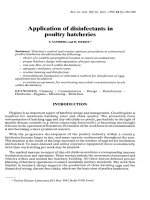Application of psychology in our everday life
Bạn đang xem bản rút gọn của tài liệu. Xem và tải ngay bản đầy đủ của tài liệu tại đây (140.03 KB, 3 trang )
Name: Phạm Bích Như Quỳnh
Class: Anh 25 – CTTT KT – K53
APPLICATION OF PSYCHOLOGY IN
EVERYDAY LIFE
EMOTIONAL INTELLIGENCE
The ability to express and control our emotions is important, and so is our
ability to understand, interpret, and respond to the emotions of others. Imagine a
world where you couldn't understand when a friend was feeling sad or when a
co-worker was angry. Psychologist refer to this ability as emotional intelligence
and some experts even suggest that it can be more important than IQ. Emotional
intelligence impacts many different aspects of our daily life. And therefore we can
use our understanding of emotional intelligence to relate better to other people
from heathier relationships, achieve greater success at work and live a more
meaningful life.
So what exactly is emotional intelligence? Emotional intelligence (EI)
refers to the ability to perceive, control and evaluate emotions. In the easiest way
to understand, emotional intelligence is basically about understanding our
emotions (and the emotions of those around us) and learning to manage the way
we handle them – in the workplace as well as in the rest of our lives.
Smart people always try to find ways to be successful and to have a
fulfilled life. And as we probably know, intellectual intelligence (IQ) is not enough
on its own to be suceesful in life, but it’s our EQ that will help us manage the
stress and emotions, which have a great influence in our life.
Emotional intelligence can help you eliminate the social complexities of
the workplace, lead and motivate others, and excel in your career. Another
problem that emotional intelligence might help you is that: If you’re unable to
manage your stress levels, it can lead to serious health problems. The first step to
improving emotional intelligence is to learn how to relieve stress. Emotional
intelligence also affects your mental health. Uncontrolled stress can also impact
your mental health, making you vulnerable to anxiety and depression. If you are
unable to understand and manage your emotions, you’ll also be open to mood
swings, while an inability to form strong relationships can leave you feeling
lonely and isolated. Last but not least, your relationship also under the influence
of emotional intelligence. By understanding your emotions and how to control
them, you’re better able to express how you feel and understand how others are
feeling. This allows you to communicate more effectively and forge stronger
relationships, both at work and in your personal life.
We can improve our emotional intelligence by quickly reducing stress in the
moment in a variety of settings; recognizig our emotions and keep them from
overwhelming us; connecting emotionally with others by using nonverbal
communication; using humor and play to stay connected in challenging
situations; resolving conflicts positively and with confidence;…
WORKING MEMORY
Have you ever gone to a trip, thinking you’ll remember everything you
need to bring along with you…but when you reached the destination, you
discovered that you forgot several items? If so, you’ve experienced the limitations
of working memory, also known as short-term memory. Working memory is the
mental sticky note we use to keep track of information until we need to use it.
Working memory is key to learning.
Working memory is limited not only in duration but alson in capacity,
typically storing about seven bits of information (give or take two). We use
working memory to remember a new telephone number, a pin number, an
address, to caculate how mich the bill will be at the supermarket checkout or to
remember the unfamiliar name foreign name of a person who has just been
introduced to you long enough to enable you to introduce them to someone else,
… Especially for students, we often use working memory in both our learning and
daily life.
Many of the learning activities that us students are engaged with in the
classroom, whether related to reading, mathematics, science, or other areas of
the curriculum, impose quite considerable burdens on working memory.
Activities often require the student to hold in mind some information (for
example, a sentence to be written down) while doing something that for them is
mentally challenging (such as spelling the individual words in the sentence).
Working memory is crucial for learning. But why? Working memory is
important because it provides a mental workspace in which we can hold
information while mentally engaged in other relevant activities. The capacity to
do this is crucial to many learning activities in the classroom.
Having weak working memory creates obstacles to learning. But there are
ways to get around these obstacles. A variety of tools that support memory are in
common use in classrooms – these include number lines, Unifix blocks and other
counting devices, cards, dictaphones, personalised dictionaries with useful
spellings, teacher notes on the class white board, and wall charts. These tools can
help in several different ways to reduce working memory loads – they may
reduce the processing demands of the activity, and they may also reduce the
storage load of the task and so help the student keep their place (e.g. number
lines). It is suggest that students are given practice in the use of memory aids in
situations with minimal working memory demands in order to establish mastery
of the basic skill, before their use in more complex activities with higher working
memory loads.
Repeated practice can reduce the strain on working-memory capacity.
Memorizing or over-learning a task allows individuals to work something out like
second nature, which is less taxing and frees up memory capacity. Repeated
practice helps one to maintain information, and by practicing and repeating what
she has learned, your child will continue to stretch her memory capacities. Oher
suggestion if we want to improve our working memory is that we should write
things out, instead of keeping them in mind and just remember. Using some type
of graphical representation for math word problems such as numbering steps,
arrows that connect information in a meaningful way, or a drawing that
summarizes the problem may be very helpful for some students.
MOTIVATION
Motivation is an essential part of our life and we can achieve anything
with a positive attitude. The right inspiring force can help you in achieving any
results, which may seem impossible otherwise. The force allows us to fulfill our
goals and lead a healthy satisfying life. If you want to change your personality for
the better, get a promotion at work, start a new habit, be a better person who is
part of the community, become a better parent for your kid – all of these things
would be easier accomplished if you are properly motivated.
So how can you develop motivation in life? If you wish to accomplish a
goal – be it short-term or long-term in nature – how can you find it in you to be
properly motivated?
First rule: Focus on one goal at a time. This should be partnered with the
fact that you should make sure that your short-term goals all help in achieving
your long-term goals. One of the best ways for you to focus on one goal at a time
is to make a diary of your goals – yes, write it down – so that you will have a
visual representation of the things that you want to achieve rather than letting it
all get lost in your head.
You might want to get rid of all the distractions which might prevent you
from achieving your goal. Let’s say that you are a writer who wants to finish a
book. How can you type away on your keyboard one chapter after another if
there are many distractions surrounding you like television, friends chattering
away or the lure of aimlessly browsing through the Internet. In order for you to
stay properly motivated, make sure to steer clear of any distractions.
One important thing to keep yourself motivated is to think of the friends
and family who truly want to see you succeed. Enlisting those with whom you
have authentic relationships is key when your motivation begins to wane. Choose
people who may have seen you fail in the past and who know how much success
means to you, says Edward L. Deci, a professor of psychology at the University of
Rochester, in New York.









